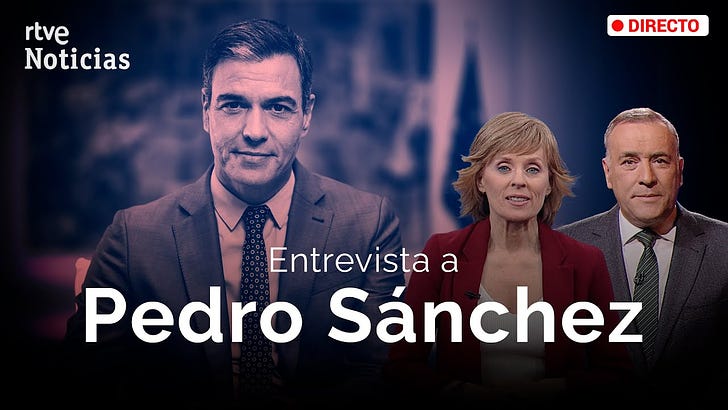🤔 This Week in Spain: Sánchez vs. the 'Mud Machine'
Also: We need a lot of immigrants, a banking merger (fun!) and Penélope Cruz's birthday.
By @IanMount and @AdrianBono | May 2, 2024 | Madrid | Issue #55
🎉 Welcome to The Tapa, an English-language, weekly newsletter about all things Spain!
🥜 This Week in a Nutshell: We’re all (“all” as in the entire country) still trying to decode what happened in the last seven days. PM Sánchez is staying but, to put it in layman’s terms… what the hell was that? Was it all an act of carefully choreographed political drama? Was he genuinely considering quitting? Did we just come back from the brink? And more importantly… what happens next? One thing is for sure: polarization just got much worse.
Oh, and happy puente to those of you living in Madrid! (Except for us, who have to work.)
🙏 Remember that if this email gets truncated at the bottom because it’s too long, just click here to read the rest on Substack.
🙌 One more thing: Remember we are offering paid subscriptions, and we’d be thrilled if you purchased one to help build this enterprise we’ve had so much fun creating. (And to those of you who have already subscribed, thanks for the love 🥰.)
🕺If you haven’t subscribed yet, please do so by clicking on the button below.
🫶 And if you already have, please send this newsletter around to your friends and family and help us keep growing.
We’re Still Trying to Understand
Sánchez Says It’s Time to Stop Disinformation Campaigns and Dirty Politics. Not Everyone is Convinced.
That was… intense.
Since Prime Minister Pedro Sánchez announced Monday that after spending a few days reflecting he had decided not to resign from office, everyone in Spain has been trying to figure lots of things out. So let’s do a quick recap first and then move on to what’s been happening since.
Prime Minister Pedro Sánchez announced in an open letter on April 24 that he was taking five days off to “reflect” on whether he wanted to stay in office, following the news that his wife was being investigated for corruption and influence peddling.
After five days of hermetic uncertainty (not even his closest staffers or Cabinet members seemed to know what he’d decide) and some expressions of support on the streets, Sánchez reappeared on Monday to say he had decided not to resign and that the time had come to start working on the “regeneration of our democracy” and for society to mobilize “against the politics of shame”.
Sánchez said that if we continue “to let bulos (fake news) control the political debate… we will have made irreparable damage to our democracy."
He didn’t elaborate on what that meant or what his new anti-disinformation crusade would look like so many were left scratching their heads and asking: WTF was this?
After the announcement, joy, confusion and fury. Since no one had any idea of what Sánchez had decided, it wasn’t until a few hours later that the official reactions started to come from all across the political spectrum. Predictably, the left (mostly) celebrated his decision and the right absolutely hated it.
PP boss Alberto Núñez Feijóo issued a (pretty angry) press conference on Monday afternoon (see video below) to “apologize to Spanish citizens” on behalf of politics, arguing that Sánchez “had made a fool of himself” and that all he had sought with this was “polarization and victimization”.
Feijóo: “Today’s speech is his most dangerous speech to date,” he said, in reference to Sánchez’s criticism of the use of alleged fake stories to attack political leaders. “He doesn’t accept disagreement and wants a country at his service”. He also said the PM should call for general elections ASAP, but said he knew this wouldn’t happen.
Santiago Abascal from far-right Vox, was even angrier and said that he expected the PP to stop all contact with PSOE and in turn work with his own party to create a joint alternative. Calling him an “autocrat” and a “tyrant”, Abascal warned about Sánchez’s speech, which he interpreted to be a “threat to all dissidents” such as judges, the media and the political opposition.
On the left, the response was, well, diverse. PSOE leaders sighed with relief and congratulated Sánchez for staying, calling him “brave” and repeating the need to “regenerate democracy”.
Others were less celebratory. Sumar’s Yolanda Díaz simply said she “respected his decision” but that people “hadn’t voted for us to turn our problems into theirs” (ouch). In a statement that was echoed by other progressive parties, she said that in the aftermath of Sánchez’s decision, the coalition government should now provide “content” and seek to reform the General Council of the Judiciary (CGPJ), which oversees Spain’s judiciary, without the PP’s involvement. (Don’t forget that the center-right party has been blocking the renewal of its members for six years now in an effort to remain in control of the judiciary and the Constitutional Court; the current members were chosen in 2013, when a PP government was in power.)
Winning! (Maybe). Three hours after Sánchez’s morning message, a flash poll that had been conducted last Friday by the Centre for Sociological Studies (CIS) was published, showing that support for Sánchez had made a significant jump after posting the letter.
The PP was outraged about it and filed a complaint before the central electoral board, arguing that the organization was asking “manipulated questions in order to create a distorted vision of reality” and that it was done to help the socialist party in the upcoming elections in Catalonia. (The CIS, whose head was appointed by the Sánchez government, is widely thought to shade its poll results to favor the PSOE.)
Seriously, so far this whole thing is doing wonders to stop polarization!
Doing the media rounds. While people were still trying to make heads or tails of Sánchez’s message, the PM started doing the media rounds with PSOE-friendly channels to (hopefully) provide some clarity. He did a sit-down interview with state owned RTVE on Monday night, and a one-on-one with journalist Àngels Barceló on Cadena Ser on Tuesday morning.
Both interviews were very similar, and Sánchez said pretty much the same in each.
Sánchez repeatedly referred to the concept of a “la máquina del fango” (which can be translated as the “mud slinging machine” or “smear machine”), created by Italian writer Umberto Eco and described as “trying to dehumanize and delegitimize the political adversary through accusations that are as scandalous as they are false”. He said that this is one of the greatest challenges of modern societies and democracies, and blamed the global right for using this methodology around the world to topple progressive governments.
Sánchez: “The goal of this mud slinging machine is to turn me into public enemy number one, and if that’s the goal, then anything’s game”.
He repeatedly said that there was a need to fight disinformation and “pseudo news websites”. However, when asked for a solution, he didn’t seem to have a clear answer (which, to be fair, no one does, especially with social media being weaponized globally to spread falsehoods).
“Until now we have no mechanisms to solve this”, he said, but “if we want democracy, society has to mobilize against these things”. He also said the media had to help. Again, no specifics.
Sánchez added that he would be talking to all parliamentary groups in order to act against it, although after listening to Feijóo’s speech Monday, he already knew what he’d say. (That would be “no thanks”).
When asked about what he meant by “democratic regeneration” (another concept that was repeated by his followers on social media), he responded he didn’t have a clear plan for that either.
Sánchez said that had he shown up with a plan on Monday, “people would have said I was just being strategic and playing politics”, and that what he was saying was just a personal reflection on what needs to be done to start a new era of Spanish politics. (Many noted that as PM he is expected to do more than offer personal reflections.) However, he said a good way to start would be to a) reform the CGPJ, b) abandon insults in Parliament (good luck with that one) and c) stop using fake news to attack political leaders.
Sánchez said all measures to tackle the “smear machine” should be created “within the framework of the Constitution” and should include people from all over the political spectrum, “left, right and center” because “this is something that affects all of us”. But, you guessed it, no specifics.
Sánchez also said he not only wants to finish his term, but could be open to more if the people voted for it. Ta-da!
Oh, he also discussed the case against his wife (in case you had forgotten how this all started). Since on Monday the PP said they would be summoning Sánchez to the Senate to question him about his wife’s business dealings, Sánchez said he’d go with her and explain “whatever we need to explain”.
So… what happens now? It’s a good question.
The PSOE seems intent on turning the whole “mud machine” thing into its new crusade. Yesterday, while attending a May 1 Workers’ Day demonstration, Deputy PM María Jesús Montero said the government was going to “unmask” all fake news, lies and delegitimization of the progressive government.
The other parties that support the coalition government are still figuring out how to react. As El País explains, "Sánchez's performance in recent days has left the majority of his parliamentary partners perplexed”, as they “fail to quite understand [his] reasons for first suggesting his resignation and then retracting."
Indeed, they all seemed unhappy with what’s happened in the last seven days. From calling it “frivolous” to “unnecessary,” parties such as Catalan separatist ERC, Basque EH Bildu or PNV and far-left Podemos have all suggested that it was maybe a good idea, but a bad execution.
Oh, and outlaw Catalonian separatist and Junts leader Carles Puigdemont? He is calling the whole thing a “farce” perpetrated by Sánchez to help Salvador Illa, the socialist candidate in the upcoming May 12 regional elections. (Remember, they are allies on a national level but enemies on a regional level). Thing is, according to a poll published today by SocioMétrica, this whole thing may have indeed helped Illa and could be destroying Puigdemont’s dreams of returning to the regional presidency.
As we described above, if anything, this whole thing seems to have polarized Spanish politics even more.
On Tuesday, for example, the spokesperson for leftist Más Madrid was kicked out of the City Hall’s plenary session for speaking out of order after calling Vox council members a bunch of “nazis”. Just another day in politics.
More news below! 👇
🔔 But First, A Message From Our Sponsor
Bucólico Café is a project of connection that was born as a specialty coffee shop.
We value time and understand that it represents both a cycle and an instant—chronology and nostalgia. Bucólico is a space that connects one’s soul with the purity, lightness and beauty of the countryside—while being in the city. Via a cup of coffee, a piece of cake or a song…
Located on Calle de Barbieri 4 — a few blocks from Plaza Chueca — Bucólico reassures the soul with a feeling of home.
Follow Bucólico Café on Instagram.
💬 Five Three things to discuss at dinner parties this week
1. 🤑 BBVA wants to buy Banco Sabadell and that’s probably important
BBVA made an official offer to buy Banco Sabadell on May 1 (isn’t that a holiday, guys?) after days of reports it was coming (and after the two had merger talks that failed in 2020).
Now, we know bank mergers are boring, but you should care a little because, you know, layoffs and bank consolidation. Think of this as your spinach story of the day.
A merged BBVA/Sabadell would be the biggest bank in Spain (by assets), passing Banco Santander and Caixabank. But not the biggest Spanish bank in the world, which will still very much be Santander.
BBVA wants to eat buy Banco Sabadell to be bigger (obvs) but also to be more developed worldly. Right now, BBVA is known for being big in Turkey (or Türkiye, if you will) and Mexico.
In fact, Mexico provides 60% of its profits, compared to 30% from Spain, which is why Expansión refers to it as a Latin American/Spanish bank (and not the other way around). Buying Sabadell would give BBVA more weight in the (boring but more stable) “developed world”, and also give it Sabadell’s small and medium business accounts, which would be nice for them.
So what’s the deal? Well, Sabadell is much more expensive now than when BBVA tried to buy it in 2020 (like 5 times as expensive!). Which is nice for people who own Sabadell shares.
BBVA is offering one share for every 4.83 shares of Sabadell. That is, they say, a 30% premium over what they were worth before the offer was made.
Banco Sabadell would get 3 board members in the combined company, and a vice-chair. Basically, BBVA is so much bigger it would just get swallowed whole. Which leads us to…
How will this affect me? Basically, in two ways.
If you work for Sabadell. In its love/offer letter to Banco Sabadell, BBVA claims that it would integrate the two workforces “without the adoption of traumatic measures that singularly affect employees of one of the two entities”. Which is another way of saying “we won’t just fire Sabadell folks”. But there are always tons of layoffs in these things and we’re pretty sure where they’d fall hardest… Indeed, Yolanda Díaz of lefty Sumar noted that there will be layoffs as she laid out why she didn’t like the merger.
As a bank customer. Every merger means one less competitor which can mean worse deals when it comes to interest and mortgage rates. If the deal goes through, the Big 3 (Santander, BBVA and Caixa) will control over 70% of the market and hold 7 of 10 mortgages. This is why the economy minister noted that there still needs to be competition and “financial inclusion.”
Our theory? BBVA has wanted to buy Banco Sabadell ever since its leaders saw the video (above) that shopkeepers in Sabadell (in Catalonia) made to promote shopping in their town. It’s done to “Gangnam Style” and it is amazing AND YOU MUST WATCH IT! (Because if we did, then you have to too).
2. 🥟 Good God, there’s an empanada shell shortage!
Spain is suffering a shortage of those little pre-made round shells you use to make empanadas. As your two fearless Tapa founders both spent long periods of their life in Argentina, we know first hand that this is a tragedy of epic proportions.
Seriously, a tragedy. As @Pedrito1984 posted on Twitter (we are not calling it X), “I know that people today are concerned about the future of the country, but there is a more urgent mystery that needs to be solved. Does anyone know why there is NO longer BUITONI aka La Cocinera empanadilla dough in ANY supermarket in Spain? PLEASE HELP. This is the END OF THE WORLD.” (No hyperbole there, it obviously is).
People began sharing where they found—and didn’t find— shells on Twitter. And then they went to the source—Nestlé España, which sells the Buitoni shells (that used to be called La Cocinera until Nestle sold the brand).
Nestlé asked some freaked out chefs to DM the company directly, so they could point them to stores that still had stock.
And Nestlé dropped a bombshell on the mundo empanada: The shortage would last three months 😱!
From the Nestlé’s mouth. “Hello! We regret to inform you that we are currently experiencing a lack of flour supply that meets our technical specifications to guarantee the qualities of our products. For this reason, we have had to temporarily suspend the manufacturing and sale of our shells for three months and BUITONI Minipizzas for one month.”
Indeed, there were problems with the shells before Nestlé stopped making them. People were complaining that they “weren’t like before” and they tore too easily, according to El País’s foodie section, El Comidista.
Thank the lord that’s solved. Suppose we just have to wait. Of course, El Comidista offered a recipe to make your own, but that sounds, like, hard.
3. 👷 Spain’s Central Bank: We’re overbooked with olds, short on immigrants
Spain is a bit short on people. That’s the latest judgment from Spain’s Central Bank (BdE) and its chair Pablo Hernández de Cos—and it didn’t come after he shot through Spain on the AVE high-speed train and noticed tons of empty space.
What did Hernández de Cos notice? Spain is full of olds and getting older. The working young pay the pensions of the olds, and there are far too few youngs being born. How big a problem is that? The BdE says it’s one of “extraordinary magnitude” and “one of the greatest challenges that the major economies will face in the coming year.” So…BIG!
Numbers please. The INE national statistics institute says that in 2053, Spain will have 14.8m retirees, 18m citizen workers, and 12m working foreigners. The issue? Spain needs about 37m immigrant workers to keep the system going as is—about 24.7 million more than it expects. Oops!
Fancy math term. The issue is the so-called “Dependency Ratio”, which quantifies how many workers there are for every non-worker (i.e. retirees and kids). The problem is that there is about one retiree for every four workers these days, which is expected to drop to less than 1:2 by 2053, and that will drain the national pension fund right quick. 😱
We can just welcome a bunch of immigrants and all good, right? Not as simple as it seems. Spain is already among the countries with the highest percentage of foreign-born residents, with 17%—behind the U.S., Germany and the U.K. but ahead of most of Europe. So, the BdE says, “It does not seem likely that immigration can prevent the aging process in which our country is immersed.” Sad!
Other options? Charge more pension taxes to current workers and cut the payments to retirees. Traditionally, governments have gone for the former because old people vote more reliably than young people (note to youngs: vote).
Taxes have already gotten an undercover rise in recent years, as salaries have risen with inflation but the Spanish tax man (i.e. the government) has not moved up the tax bands, so more people are paying higher rates without being in a higher social class.
Non-helpful advice. Stay healthy and retire later. Sorry, we have no good advice here. But the weather’s lovely, right? 🌞
4. 🧑🍳 MasterChef 12 goes all in on self-care
MasterChef is where you get all your mental health news, right? Well, if for some strange reason the answer is ‘no’, we’ll catch you up.
Chef/judge Jordi Cruz of Barcelona’s Michelin 3* ABaC restaurant got in hot water on last week’s show when a contestant named Tamara decided to leave the show because, she told another judge (Pepe Rodríguez), staying would be bad for her mental health.
Tamara told Pepe she “would be better” at home. “Even if I were crazy, I wouldn't open a restaurant, it's very hard work with long hours,” she said. “I have a husband, a son and a life that for me is worth much more than spending my life in a restaurant."
Jordi did not take this well. He told Tamara if she were talking to him like that he would have already shown her the door. He added, “Pepe is asking you questions. I have none. I would only say, ‘Fine. Ciao.’ You’ve taken an opportunity from someone else.”
Tamara in turn did not take Jordi well. “I feel very frustrated and I don't want to continue in the same dynamic in which I am not well,” she said. “Forgive me, but it is more important to be well than to disappoint you, with all the love in the world.”
This set off a huge kerfuffle over the importance of mental health and how Jordi Cruz treats contestants.
Public broadcaster La 1 pulled the show from its online service RTVE Play, and Health Minister Mónica García chimed in on Twitter to rebuke Jordi: “No, prioritizing emotional well-being over the frenetic pace of life is not selfishness, but a brave decision.”
Cruz figured he’d stepped in it a little, so this week he published the above Insta video with Tamara (making a carrot cake—the new peace pipe) and said by way of apology, “I usually say things with character to people who have character. I assure you that Tamara is a strong-minded person," and, “We are not there to destroy or attack anyone. We are doing TV. It's TV that I take very seriously. When we're not recording, we all get along very well. That I get very serious? Excuse me. I've been very serious for 12 years. Have I screwed up? Could I have said it better? Sure.”
So in case anyone asks you everything is fine and we’ve all learned a lesson about the importance of self-care. Or something like that. Because that’s what cooking shows are for. We guess.
5. 💃 Penelope Cruz turned 50 and had a really big party (and you weren’t invited)
Penelope Cruz is basically the only person named ‘Penelope’ in Spain. Fine, she’s one of 1,448, whose average age is 34. But this one—our Penelope—is a massive Hollywood star who just turned 50 and forgot to invite us to her NYC bash. We only hold it against her a little bit.
PC turned 50 on April 28, and celebrated it rock star style. First, she and hubs Javier Bardem attended a Bad Bunny concert in Brooklyn’s Barclays Center, to which photo evidence suggests she wore a fuzzy white cowboy hat (Pé, as she is apparently known, can pull this off; we—and you—cannot).
Post concert included a backstage visit with Bad Bunny (aka Benito).
The rooftop NYC party (to which we clearly just misplaced our invite) took it to another level. Those who did not lose their invite and attended include Rosalía, Irina Shayk, Robert de Niro, Adam Driver, Matt Damon, Maggie Gyllenhaal, Goya Toledo, Ricky Martin (with a beard!), Salma Hayek and, of course, Pedro Almodóvar.
And as Vanity Fair España tells us breathlessly, they sang “Happy Birthday” in Spanish (or, rather, Cumpleaños feliz en español)! As filmed by Italian fashion designer Riccardo Tisci. We would have filmed it, had we not lost our invite.
🙏 Before you go, please remember to share this newsletter with your friends on social media. The more we grow, the more information we’ll be able to offer each week.










I appreciate your stance vis-a-vis not calling Twitter by the dumb name.